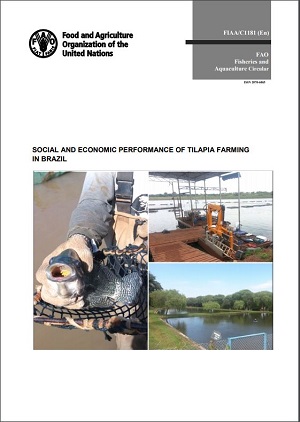 Abstract
Abstract
The goal of the document is to provide a comprehensive and balanced assessment of the technical, economic and social dimensions of tilapia farming in Brazil with a focus on its socio-economic impacts. The document is based on local data and information (including field data) provided by government agencies and research institutes (e.g. Embrapa) in Brazil and incorporates the latest FAO statistics on global fishery and aquaculture production and fisheries commodities trade. The document follows the structure of a previous FAO publication on the social and economic performance of tilapia farming in five African countries (i.e. FAO Fisheries and Aquaculture Circular No. 1130), as well as one on the social and economic dimensions of seaweed farming in six countries worldwide (i.e. FAO Fisheries and Aquaculture Technical Paper No. 580).
Tilapia is the most popular aquaculture species item farmed in over 120 countries or territories worldwide. Global tilapia aquaculture production grew 11 percent annually (or 13 percent in terms of farmgate value) over the past three decades, from 0.3 million tonnes (USD 304 million) in 1987 to 5.9 million tonnes (USD 11 billion) in 2017. Aquaculture production in Brazil increased 14 percent annually (or 12 percent in terms of farmgate value), from 13 000 tonnes (USD 56 million) in 1987 to 595 000 tonnes (USD 1.5 billion) in 2017, making it a regional aquaculture powerhouse contributing to 20 percent of Latin America and the Caribbean ’s aquaculture production in 2017. In Brazil, tilapia has been the largest aquaculture item, contributing to nearly half of the country’s aquaculture production tonnage in 2017. This document assesses tilapia farming and the value chain in Brazil by examining tilapia farming technology and practices, dissecting the tilapia value chain, evaluating the sector’s social and economic performance, discussing the importance of proper governance to the sector development, and highlighting potentials, issues, constraints and challenges in the development of tilapia farming or aquaculture in general in Brazil.
Read More